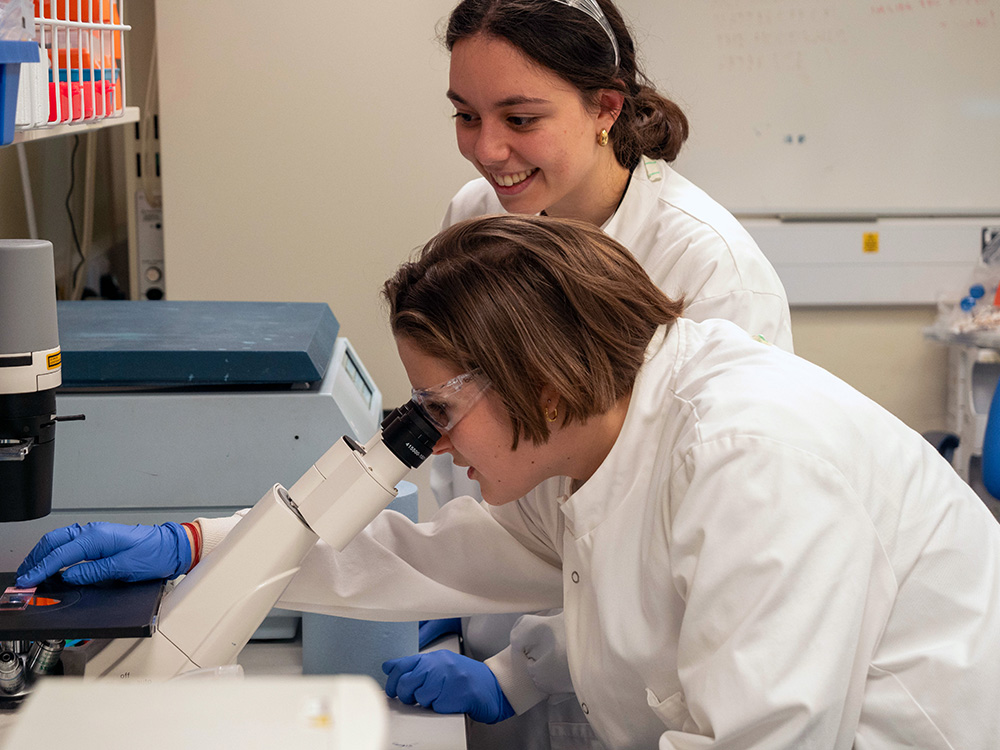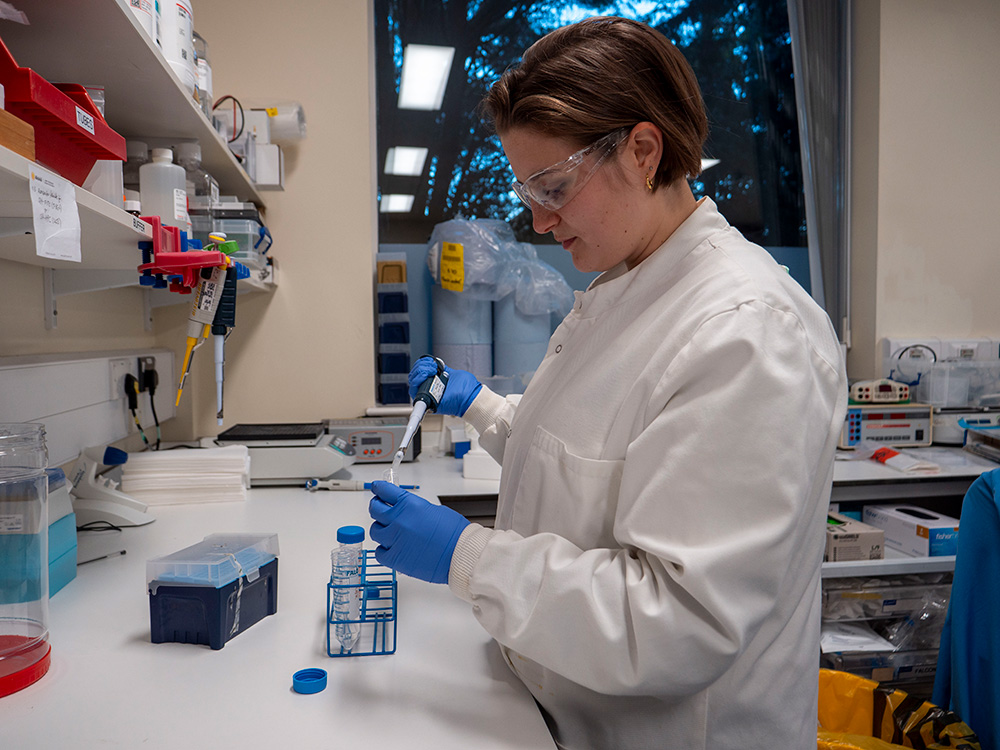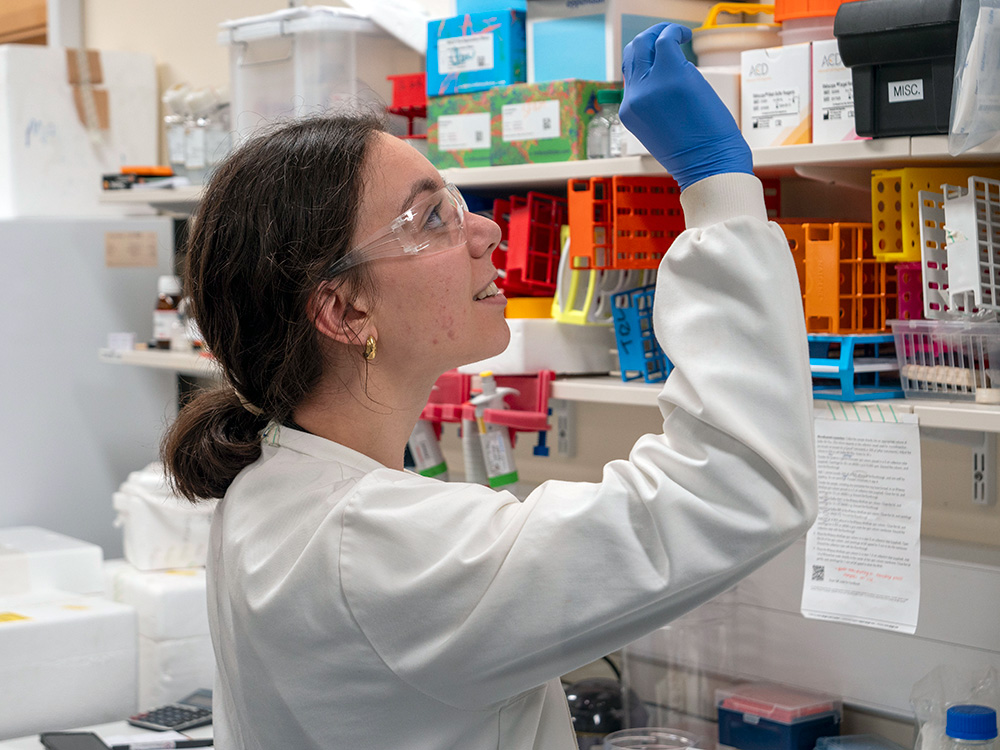Longevity scientists send human tissue to space to study ageing
The experiment could help extend people’s health into later life.
Dr Loren Kell, a recent doctoral graduate, and Maria Kyriazi, a second-year doctoral student, are members of a research group that has sent samples of human tissue in the form of organoids to space as part of a pioneering experiment that could help extend health into later life.

In the early hours of 5 November, Kell and Kyriazi joined colleagues at the Space Innovation Lab, which was established in 2023, to watch live as a rocket carrying the samples took off from the Kennedy Space Center in Florida, USA, before beginning its flight to the International Space Station (ISS). Once onboard, the box that contained the samples was fitted into the station’s ICE Cubes Facility, providing a data feed to the group’s lab, led by Dr Ghada Alsaleh, in Oxford and allowing the group to interact with the samples in real time.
The samples are to be returned safely to Florida, from where they will be sent on to Oxford for analysis. They are being compared to control samples that remained on Earth. According to Kell, there is a possibility of discovering new pathways of ageing.
Dr Alsaleh, the principal investigator, has described the project as “ground-breaking” and said that the findings “could significantly improve the quality of life for people on Earth”.

The experiment is based on previous evidence that exposure to the space environment accelerates the ageing process in humans.
In 2019, NASA found that for the year astronaut Scott Kelly was aboard the ISS, he displayed signs of ageing faster than his identical twin brother Mark had done on Earth. For scientists in the longevity field like Kell and Kyriazi, this promised an exciting line of research.
If being in space accelerated how quickly Scott aged, Kell says, there may be pathways that can be modulated to reduce the rate of ageing. Life-changing drugs could be developed to “turn on” pathways that slow ageing, or “turn off” pathways that speed up ageing, delaying the onset of chronic diseases such as dementia.
These outcomes could result in longer total lifespans. Yet what interests Kell and Kyriazi is not so much that as increasing the proportion of life people spend in good health. “What we do in the lab”, Kyriazi explains, “is try to find ways for all people to live better so they don’t live from the age of 65 to 100 but in very poor health.”
Kell adds: “We’ve had all these big leaps in healthcare and sanitation and diet, and the great thing is that that’s made people live a lot longer. But the problem is that, though people are living longer, the actual period of life when they’re healthy has generally stayed the same.”

Kell and Kyriazi, who are both recipients of Oriel College’s Mellon Longevity Graduate Scholarship, study the role of a physiological process known as cell senescence in ageing. With age, cells begin to stop replicating and then accumulate in the body. The accumulation of these “senescent” cells correlates with the onset of various age-related diseases. But the relationship is poorly understood.
While Kell studies the role of cell senescence in the dysfunction of the immune system with age, and how immune responses might be “rejuvenated” in old age, Kyriazi focuses on understanding why older adults are more susceptible to musculoskeletal diseases such as osteoarthritis by studying how senescent cells contribute to their development.
They are both ecstatic about the space experiment and the possibility of unlocking some of the secrets of ageing. “This project was an amazing surprise for all of us. When we both started, it wasn’t planned, so we were thrilled to see this happening from the start,” says Kyriazi.
On the night of the launch, “Everyone was very excited, really just genuinely excited,” Kell recalls.
The maiden experiment will be followed by additional tests in space over several years. The aim is to arrive at a more reliable model of ageing that can be used to test interventions including drug therapies and even lifestyle changes that delay the onset of health issues.
The experiments will also test putative anti-ageing drugs which could protect astronauts from the adverse effects of space flight.